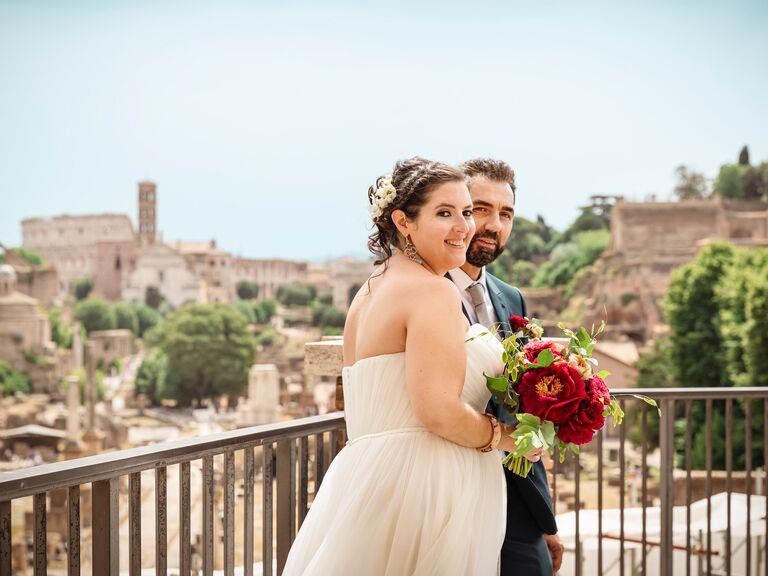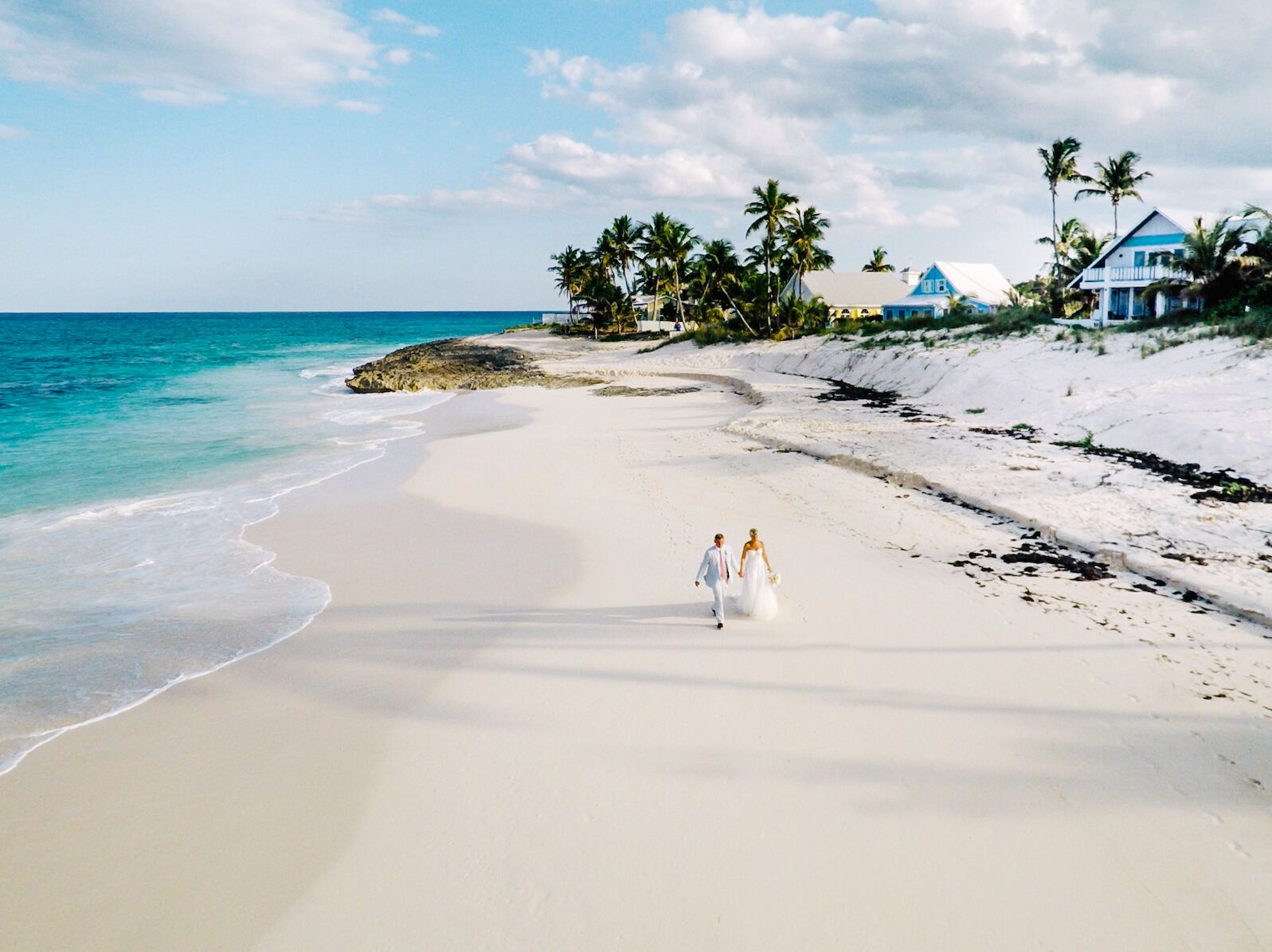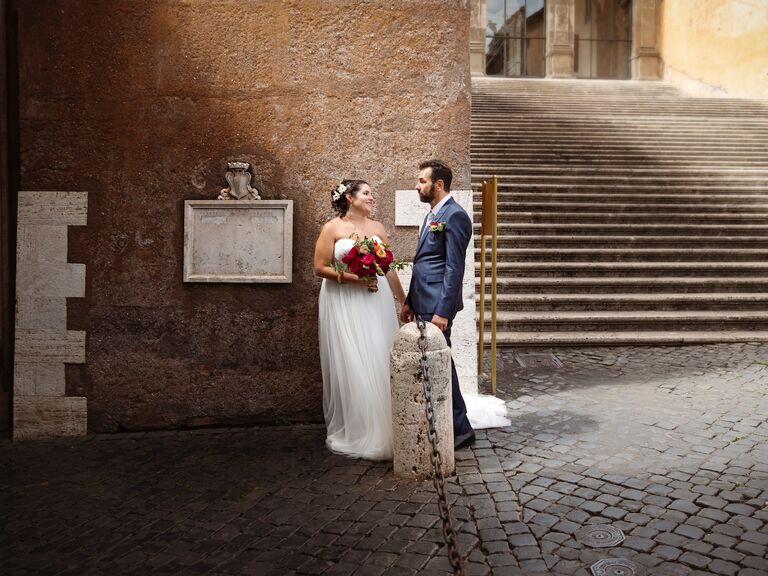What to Know About Getting Married in Europe: Legal Requirements & Planning Tips


For many couples, getting married in Europe is a dream scenario. Whether you fantasize about throwing a big bash at a villa in the Tuscan countryside, eloping on the glamorous French Riviera, or hosting a sophisticated urban affair in London, Europe abounds with possibilities. Some of the best destination wedding locations of 2024-2025 include these and other European locales like Portugal, Ireland, Paris, Rome, Spain, the Amalfi Coast, and the Loire Valley.
"Europe offers a plethora of gorgeous backdrops for a couple's nuptials–from storybook castles to breathtaking beaches to vibrant gardens, pastoral countryside to undulating vineyards and iconic cityscapes," says Jack Ezon, Founder & Managing Partner of EMBARK Beyond, a luxury travel advisory with a network of advisors that specialize in destinations around the world. "They are so popular that just over 62% of our destination events flock to Europe."
Of course, planning a wedding abroad—especially in a country with a different language, currency, and customs—isn't as simple as planning one at home. Read on for some crucial things to take into consideration if you're thinking about getting married in Europe.
How to Get Married in Europe

Legal Weddings vs. Symbolic Weddings
You can choose to have either a legal wedding or a symbolic wedding in Europe, though the requirements for legal weddings vary from country to country. Symbolic weddings are much easier to plan because you get the legal requirements out of the way at home and only have to worry about organizing the wedding ceremony abroad.
"We always tell our clients to get a civil marriage at city hall in their home state or state of residency," Ezon says, explaining that if any problems arise down the road (whether divorce, death, or something else), it's better to be governed by local laws and not have to rely on foreign lawyers.
Required Legal Documents for U.S. Citizens
The required documents and bureaucracy involved in getting them approved vary from country to country, but generally speaking, U.S. citizens will likely need the following:
- A valid U.S. passport
- Your birth certificate (original or certified copy)
- Evidence of the termination of any previous marriage if applicable (i.e. divorce decree, annulment decree, or the death certificate of a former spouse)
- An affidavit swearing that there is no legal impediment to your marriage according to the laws of the U.S. state in which you are a resident (in some cases this must be done in person at the U.S. embassy in the city in which you plan to get married and signed by a U.S. consular officer)
- Declaration of intention to marry (submitted to the Marriage Office in the town hall where you intend to get married along with all other required documents)
Some countries require additional documentation. France and Spain, for example, require proof of residence (i.e. proof that you live in the district where you intend to marry). The U.K. requires you to apply for a marriage visa unless you or your spouse is a British or Irish citizen.
Keep in mind that if you plan on getting married legally in a country where the official language is not English, you will likely need to present certified translations of your documents with an apostille and any appointments at city or town halls will happen in the country's official language. In some countries, such as Italy, you need to have two witnesses present at the marriage ceremony and if they don't speak Italian fluently, you'll need to hire a translator.
Legal Marriage Timeline
The timeline to plan a legal marriage can vary greatly depending on the required documents and bureaucratic procedures that you need to complete in advance, ranging from a few weeks to more than a year.
In my personal experience as a U.S. citizen marrying an Italian citizen in Rome, I spent about six months getting all the necessary documents in order, having them certified and legalized, and going for in-person appointments at the U.S. Embassy, an Italian civil court, the local town hall in the district where I live, and the Marriage Office at the main City Hall in order to secure a date for my wedding. For information, consult the U.S. embassy of the country where you plan to get married.
Legal Marriage Cost
The cost of a legal wedding in Europe varies from country to country and even city to city. The U.S. Embassy in Italy, for example, cites a range of €500 to €9,200 as the rental fee for the marriage hall. In my experience, the cost was less but only because my husband is a legal resident in Rome.

Requirements for U.S. Citizens Traveling to Europe in 2024
Citizens of more than 60 visa-exempt countries (including the U.S.) will soon need to request authorization to travel to countries in the European Union via ETIAS (the European Travel Information and Authorization System) in advance of their trip. However, the implementation of this new requirement has been delayed until mid-2025.



Planning Tips for Getting Married in Europe

Choosing Your Location
When it comes to choosing a location for a destination wedding in Europe, you should consider factors like seasonality, your budget, and the logistics of getting your guests to the venue. According to Ezon, some of the most popular locations for destination weddings in Europe are Lake Como, the Amalfi Coast and Capri, Tuscany and Provence for countryside weddings (though Portugal's Douro Valley is quickly catching up), and the French Riviera. The most popular cities are Paris and Florence, with Rome, Venice, and London just behind them.
The most expensive countries for a destination wedding are France, Italy, and the U.K., according to Ezon. "If you want to stay in those countries, consider secondary or charming tertiary locations that are not magnets for American tourists. For example, in Italy, think of Umbria or Piemonte – even the Veneto, the 'castle country' right outside Venice instead of Venice proper," he says.
In addition to these, Spain, Croatia, and Portugal are wonderful options with excellent value. According to Ezon, "A wine-land wedding in the Douro Valley of Portugal or Spain can cost less than half Tuscany or Provence."
Consult a Destination Wedding Planner and Travel Expert
If working with a wedding planner for a domestic wedding is important, it's crucial when planning a wedding abroad, especially when dealing with potential language barriers. Wedding planners with expertise in the country where you plan to get married will anticipate issues that you may never have considered, such as customs or immigration restrictions, including import duties, tax or permits needed if you bring in outside vendors, such as a DJ or photographer, as well as rental costs, catering, and so much more. They can also help plan activities for your guests before and after the wedding, from sightseeing to rehearsal dinners.
Destination Wedding Budgeting Tips

Many couples choose to get married in Europe because it can actually cost less than getting married in the U.S. and represents such a great value overall. According to the Knot's 2022 Real Weddings Study, the average cost of a destination wedding in the U.S. was $36,400, while it was $32,100 for a wedding outside of the U.S.
In Europe, of course, the price tag of your event will vary from country to country. You'll need to take into account seasonality, flights, hotels, rental fees for your venue, catering, and entertainment such as a DJ or band. The Knot's 2019 Global Worldwide Wedding Report found that of the 14 countries where the couples surveyed got married, the least expensive country in Europe is Portugal, with an average cost of $16,700 for 126 guests, while the most expensive is Spain, with an average cost of $23,400 for 130 guests.
Selecting Your Venue and Vendors
Wherever you decide to get married, plan to visit the venue several times before the big day. You'll likely want to go on a scouting trip to look at multiple venues in your destination of choice. When you decide which venue to book, you might need to return to sign a contract and make a downpayment. After that, you should plan to return about three to four months before your wedding date to organize the details.
Keep in mind that some European countries essentially shut down in August, so if you're planning a wedding for September, you'll need to firm up all the arrangements by July or risk scrambling at the last minute. This is one of the reasons why we recommend working with a wedding planner who can smooth out these arrangements for you.



















